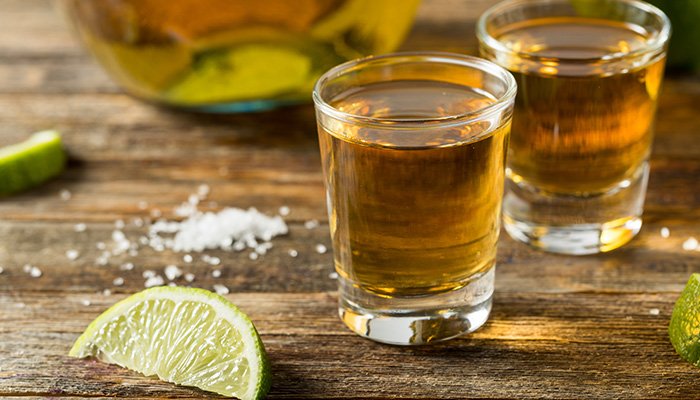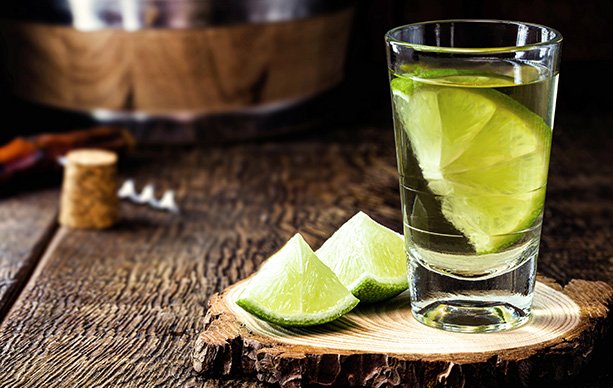Tequila, a spirit steeped in Mexican tradition, is celebrated globally for its vibrant, bold flavor and its role in iconic cocktails like margaritas. Beyond its ability to enhance a party, tequila may also offer unexpected health benefits linked to weight loss and maintaining a healthy balance.
Crafted from the blue agave plant, this high-quality tequila stands apart in the realm of alcoholic beverages. It’s not just about the good times; its unique ingredients may support better calcium absorption, crucial for bone health.
In our exploration, we’ll delve into the nutritional content of tequila, examining how its calories, sugars, and carbohydrates compare with other spirits, addressing health concerns along the way.
Join us as we uncover the layers of this celebrated drink, understanding what lies beneath its spirited surface, and exploring whether tequila can contribute to more than just festive indulgence.

Nutritional Facts about Tequila
Tequila is more than just a party staple; it also has a notable nutritional profile. Made from the blue agave plant, it differs from other spirits in its calorie, sugar, and carbohydrate content. This section explores these aspects, offering valuable information for those who appreciate spirits but also watch their diet.
Calories in Tequila
Each shot of tequila, measuring approximately one ounce, typically contains between 64 to 69 calories. This relatively low caloric content makes tequila one of the lighter alcoholic options available.
When compared to a glass of red or white wine which might contain 120 to 125 calories, or a single beer which can have over 150 calories depending on the type, tequila offers a calorie-conscious alternative that doesn’t sacrifice the enjoyment of partaking in social or celebratory occasions.
Sugar Content
Unlike many other spirits, tequila that is labeled as 100% blue agave offers minimal to no sugar content. During the fermentation process, the natural sugars known as agavins are converted into ethanol, effectively eliminating simple sugars from the final distilled product.
This characteristic is particularly advantageous for those managing conditions such as diabetes or adhering to dietary preferences that require monitoring sugar intake. The lack of residual sugars in pure agave tequila means that it does not spike blood glucose levels, which is an important consideration for maintaining balanced blood sugar levels throughout the day.
Carbohydrates
Tequila made from 100% blue agave contains zero carbohydrates, making it an appealing choice for those following low-carbohydrate or ketogenic diets. This absence of carbohydrates is due to the distillation process, which removes all fermentable sugars, converting them into alcohol.
This makes tequila a suitable option for those looking to enjoy a drink without disrupting their metabolic state, such as ketosis, which is often the goal in a ketogenic diet for effective weight management and energy regulation.
Understanding these nutritional aspects of tequila allows individuals to make more informed decisions about incorporating this spirit into their lifestyle, especially when considering dietary constraints or health objectives.

Potential Health Benefits of Tequila
Tequila harbors unique components that may contribute positively to health. From aiding in digestion and potentially supporting bone health to its role in cardiovascular well-being, the attributes of tequila go beyond its cultural significance and bold flavors.
Discover how enjoying tequila responsibly can unlock a variety of benefits, showcasing that this spirited beverage offers more than just a lively addition to celebrations.
1. Agavins and Blood Sugar Levels
Agavins, the natural sugars found in the agave plant from which tequila is distilled, offer a unique benefit compared to typical sugars. Unlike refined sugars that cause spikes in blood glucose levels, agavins do not get absorbed by the body.
Instead, they act as dietary fibers, aiding in the regulation of blood sugar and possibly enhancing insulin production. This makes tequila, particularly the pure varieties made from 100% agave, a spirit worth considering for individuals managing diabetes.
However, any inclusion of alcohol in a dietary plan should be done sparingly and under strict guidance from healthcare professionals to ensure overall health is maintained.
2. Probiotic-like Benefits
Tequila contains fructans, which, although not probiotics themselves, have prebiotic properties that foster the growth of healthy bacteria in the gut. These beneficial bacteria are crucial for maintaining a healthy digestive system and strong immune function.
By supporting the growth of good bacteria, tequila can indirectly enhance digestive health and may contribute to improved immune response. This supportive role in gut health can be particularly beneficial in a balanced diet, contributing to the overall well-being when tequila is consumed in moderation.
3. Possible Cardiovascular Benefits
Moderate consumption of tequila could potentially influence cardiovascular health positively. Some research suggests that tequila can lower LDL cholesterol (the “bad” cholesterol) and raise HDL cholesterol (the “good” cholesterol).
These effects might help prevent the formation of plaque in the arteries, reducing the risk of heart diseases. However, it’s essential to balance these potential benefits with the known risks of alcohol consumption.

4. Bone Health
The fructans in agave, a key ingredient in tequila, play a significant role in how the body handles essential minerals like calcium. Research suggests these natural compounds enhance the body’s ability to absorb calcium, which is vital for maintaining strong and healthy bones.
Regular, moderate consumption of tequila could potentially assist in improving bone density and preventing conditions such as osteoporosis. This benefit is particularly valuable as we age, making tequila a noteworthy choice for those mindful of their bone health.
5. Gluten-Free Status
For individuals with celiac disease or gluten sensitivity, finding enjoyable beverages that don’t compromise health can be challenging. Tequila offers a gluten-free alternative because it is distilled from the agave plant, which naturally contains no gluten.
This makes tequila a safe and appealing option for those who need to avoid gluten but still wish to partake in social drinking without concern.
6. Weight Management
Tequila’s low calorie and minimal sugar profile make it an ally in weight management, especially when compared to other alcoholic beverages that are high in sugars and calories.
A shot of 100% agave tequila contains very few calories and almost no sugars, preventing the common blood sugar spikes and subsequent crashes associated with higher-calorie, sugary drinks.
Including tequila in a balanced lifestyle, when consumed in moderation, can help maintain a healthy weight without foregoing social libations.
Comparing Tequila to Other Spirits
As we navigate the spirited landscape, tequila distinguishes itself with unique attributes that make it stand out from other popular drinks like vodka, rum, and whiskey. Let’s explore how tequila measures up in terms of caloric content and overall health impacts, offering you insights to sip smarter.
Caloric Comparison
Tequila shines when it comes to calorie counts, presenting a leaner option for those watching their intake. Typically, a shot of tequila contains about 64 to 69 calories—noticeably lower than the 70 to 100 calories found in equivalent servings of other spirits.
This lower calorie count positions tequila as a favorable choice for those aiming to enjoy a drink without tipping the scales.

Healthier Alcohol Choice?
While labeling any alcoholic drink as “healthy” is misleading due to the inherent risks of alcohol consumption, tequila does offer some comparative advantages.
Produced exclusively from the blue agave plant, tequila is naturally free from sugars and carbohydrates when distilled purely, which is a boon for those managing sugar intake or adhering to low-carb diets.
Moreover, the agavins—natural components of agave—do not impact blood sugar levels like other sugars, potentially supporting better glycemic control. Coupled with potential benefits like aiding in digestion and supporting metabolic health, tequila might just be a step ahead of its counterparts.
Of course, moderation is paramount, but when choosing your next drink, tequila’s unique properties could tip the scales in its favor.
Risks and Side Effects of Tequila
While we’ve explored the nuances that might make tequila a standout choice among spirits, it’s essential to address the potential risks and side effects associated with its consumption.
From debunking health myths to understanding the long-term implications of regular drinking, this section aims to provide a balanced view, ensuring you can make informed decisions about including tequila in your celebrations.
Misleading Health Claims
Despite the intriguing benefits discussed earlier, it’s important to clarify that tequila is not a health elixir. Claims that it can cure diseases or serve as a therapeutic beverage are not only unfounded but potentially dangerous.
While tequila contains components like agavins that offer certain health advantages, these benefits are often overshadowed by the risks inherent in alcohol consumption. Understanding this helps temper expectations and encourages responsible drinking.
Alcohol Dependence
One of the more severe risks associated with consuming tequila—or any alcohol, for that matter—is the potential for developing alcohol dependence.
Regular consumption, especially in large quantities, can disrupt the balance of neurotransmitters in the brain, leading to a dependence that can be difficult to break.
This risk significantly diminishes any potential health benefits and calls for moderation and caution in consumption habits.
Liver Damage and Other Health Risks
Chronic alcohol consumption is notoriously linked to a slew of serious health issues, notably liver damage. The liver is crucial for filtering toxins, and regular alcohol intake can impede its function, leading to conditions such as fatty liver, hepatitis, and even cirrhosis.
Beyond the liver, excessive drinking can increase the risk of cardiovascular diseases, compromise immune function, and lead to other debilitating health conditions. These risks serve as a stark reminder that while tequila may enhance a festive occasion, its health implications are not to be taken lightly.
In understanding both the potential benefits and risks, tequila enthusiasts can enjoy this spirited beverage in a way that respects its potency and their health. As always, moderation is key, and being fully informed is the best strategy for any responsible drinker.

How to Incorporate Tequila Responsibly
After delving into the unique aspects and potential benefits of tequila, it’s crucial to discuss how to integrate this spirit into your lifestyle responsibly.
Enjoying tequila can be part of a balanced approach to drinking, provided it’s done with mindfulness and moderation. Here, we provide some guidelines to help you savor tequila while maintaining your well-being and safety.
Moderation and Safe Consumption
Moderation is the cornerstone of responsible alcohol consumption. For tequila, as with any alcohol, this means adhering to recommended limits—up to one drink per day for women and two for men, as guided by health experts.
Staying within these boundaries not only helps manage alcohol intake but also reduces the risk of the negative health effects associated with excessive drinking.
Tips for Enjoying Tequila Safely
To make the most of your tequila experience without compromising health, consider these tips:
- Choose Quality Over Quantity: Always opt for 100% agave tequila, such as our Filo de Agave. This ensures you are consuming a purer product without additives that could exacerbate hangovers or lead to other adverse effects.
- Simple is Better: Enjoy tequila straight to appreciate its true flavor, or if you prefer mixed drinks, use low-sugar mixers. High-sugar mixers can mask the amount of alcohol you’re consuming and lead to quicker impairment and more severe hangovers.
- Stay Hydrated: Alcohol has diuretic properties, which means it increases the rate at which your body expels water. To counteract dehydration, drink plenty of water alongside your tequila. A good rule of thumb is to alternate between a glass of water and a drink.
- Savor the Flavor: Tequila is rich in history and complexity. Sip it slowly to truly appreciate its nuances, rather than drinking quickly. Taking your time can help reduce consumption and enhance enjoyment.
- Know When to Say No: Being mindful of your body’s responses to alcohol and understanding your limits are vital. If you feel you’ve had enough, listen to your body and stop drinking.
By embracing these practices, you can enjoy tequila as a delightful part of your dining and social experiences without undue risk. Remember, responsible drinking not only protects your health but also enhances your enjoyment by leaving you in good spirits the next day.
So, is Tequila healthy for you?
In the spirited journey through the world of tequila, we’ve uncovered that this celebrated drink is more than just a staple of nightlife and festivities—it also carries intriguing potential health benefits when enjoyed in moderation.
From aiding in digestion and potentially supporting cardiovascular health to its minimal impact on blood sugar levels, tequila presents a compelling case for those who choose to imbibe.
However, the key to incorporating tequila—or any alcohol—into a healthy lifestyle lies in moderation. It’s essential to balance enjoyment with responsibility and to be mindful of the quantity and frequency of consumption.
Listening to your body and understanding your personal health and dietary needs are crucial steps in ensuring that tequila can be a pleasurable addition to your life without adverse effects.
As you reach for that next glass of tequila, remember to savor each sip, appreciating the rich flavors and heritage of this unique spirit.
Celebrate responsibly, keeping in mind that the best way to enjoy tequila is with a clear understanding of its effects on your health and well-being. Here’s to making informed choices that enhance your experiences while looking after your health!
Cheers to a balanced and thoughtful approach to tequila and to life.
Frequently Asked Questions
Is Tequila Gluten Free?
Pure tequila, distilled from 100% blue agave, is naturally gluten-free, suitable for those with celiac disease. However, ‘mixto’ tequilas might include additives derived from gluten sources. Always verify that the label states ‘100% agave’ to ensure safety.
Is Tequila ketogenic?
Tequila is ideal for a ketogenic diet, boasting zero carbohydrates per serving. Its pure form allows it to be enjoyed straight or with keto-friendly mixers like diet soda or seltzer, maintaining low carb intake crucial for ketosis.
Does Tequila have sugar?
Tequila, especially when pure and made from 100% agave, contains minimal to no sugar, making it an excellent choice for those monitoring their sugar intake. Opt for high-quality, unflavored tequila to avoid added sugars and enjoy this spirit without the sweet concern.
Does Tequila have calories?
Yes, tequila contains calories. A standard shot of tequila (about 1.5 ounces) typically has around 97 calories, which is comparatively lower than many other alcoholic beverages. It also contains 0 grams of carbs, fat, and protein.

